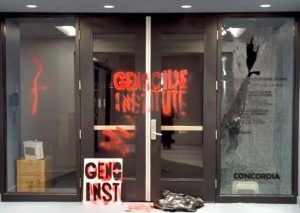A three-day anti-Israel strike at McGill University has led to campus unrest, cancelled classes, and growing fears among some students, particularly within the Jewish community.
The strike, held from April 2 to 4, followed the approval of a motion passed at a Students’ Society of McGill University (SSMU) Special General Assembly on March 27, calling for McGill to divest from companies involved in weapons manufacturing and operations in Israel.
While participation in the strike was voluntary, SSMU encouraged the administration to honour the “will of the student body” and not penalize absences.
Though the university declined to cancel classes, the protests have resulted in dozens of disruptions, with reports of Jewish students being trapped in classrooms and destruction on campus.
In an emailed statement to The CJN, McGill University said, “While yesterday (April 2) about 20 classes have either resumed after short delays, been moved online or cancelled, the vast majority of academic activities at McGill have proceeded as scheduled. Today, more classes had to be cancelled and some protesters engaged in acts of vandalism.”
The university added that it was working with Montreal police to reduce disruptions and ensure access to classrooms. As of Friday, all students and staff must scan their McGill ID cards to enter campus buildings.
Elia Nissan, an Emerson Fellow with StandWithUs Canada and co-president of Israel on Campus McGill, said she has “not seen this level of mayhem since the earlier days of Oct. 7.”
Nissan witnessed masked demonstrators blocking classroom doors.
“A professor came out trying to ask if her students could be let in to his class,” she told The Canadian Jewish News. “They didn’t say anything. They just looked away and continued standing by the door.”
Nissan described a campus environment of confusion and fear, including reports of physical altercations.
“One of the people we know said he wasn’t able to come out of class and needed someone to come get him,” she said. “Another student was accidentally punched and now has a black eye because of the protesters.”
Nissan recalled seeing police with shields inside the McConnell engineering building and mounted officers patrolling outside, while chants of “From the River to the Sea” rang through the campus. Nissan said the atmosphere was unsettling, with students expressing fear. Despite raising these concerns with campus security, she said staff admitted they could not act without higher-level approval.
“We’re literally not able to study at our educational institution,” she said.
On social media, B’nai Brith Canada denounced the actions of protesters on April 3: “Anti-Israel protesters are physically blocking access to lecture halls inside the Bronfman building and disrupting classes, preventing fellow students from accessing their right to education. Protest is a protected right—intimidation is not.”
A joint statement from Federation CJA and the Centre for Israel and Jewish Affairs said the advocacy groups had been warning the university “for weeks” about the risks that the strike posed to students.
“Today, a small group of pro-Hamas sympathizers proved us right as they harassed and intimidated the campus community, pressuring them to adopt or support their radical agenda. How is it possible that we have to yet again say, “Enough is enough?
“Only a few hours into the strike, we have witnessed images of a female student being shoved for the simple act of trying to attend a class, while others were locked in a classroom yet again, as masked protesters seemingly had free rein to intimidate, write on chalkboards, and block classes. Has anyone checked the identity of the masked individuals to ensure they even have a right to be inside the buildings? This has nothing to do with peaceful protest. This is about chaos and anarchy, hatred, and desecration of our common values,” the statement continued.
“Rules must be applied; perpetrators must know there are consequences for their actions. And the insanity that is running rampant on our campuses must stop once and for all!”
Montreal police confirmed they were present on campus to manage tensions between protesters and counter-protesters.
“Police officers were there to make sure that those two groups (don’t) merge together and commit any criminal acts,” Agent Manuel Coupre told the National Post.
Videos from the scene showed demonstrators wearing masks and keffiyehs, chanting and forming picket lines outside buildings. On social media, Solidarity for Palestinian Human Rights (SPHR) McGill praised the disruptions, writing: “Over 16 auditorium classrooms were confronted with student-led pickets, effectively enforcing the strike mandate.”
The post added: “Resistance until divestment… Long live Gaza, the graveyard of the occupation, and long live the Student Intifada.”
McGill has consistently rejected calls to adopt a boycott, divestment and sanctions (BDS) policy. While it previously reviewed its investments, the university has not committed to divesting from arms manufacturers.
Despite SSMU’s framing of the strike as peaceful and in support of Palestinian liberation, some students say the university’s response has fallen short.
“The administration refused to be proactive,” said Nissan. “They’re always reactive with measures that are not effective. We need the administration to take steps before classes are cancelled, before people are fearful.”
Author

Mitch is The CJN's campus and education reporter based in Toronto, Ont. He has a passion for investigative research, long-form feature writing and digital journalism. His book, Home Safe, was published by Dundurn Press in November 2022.
View all posts








